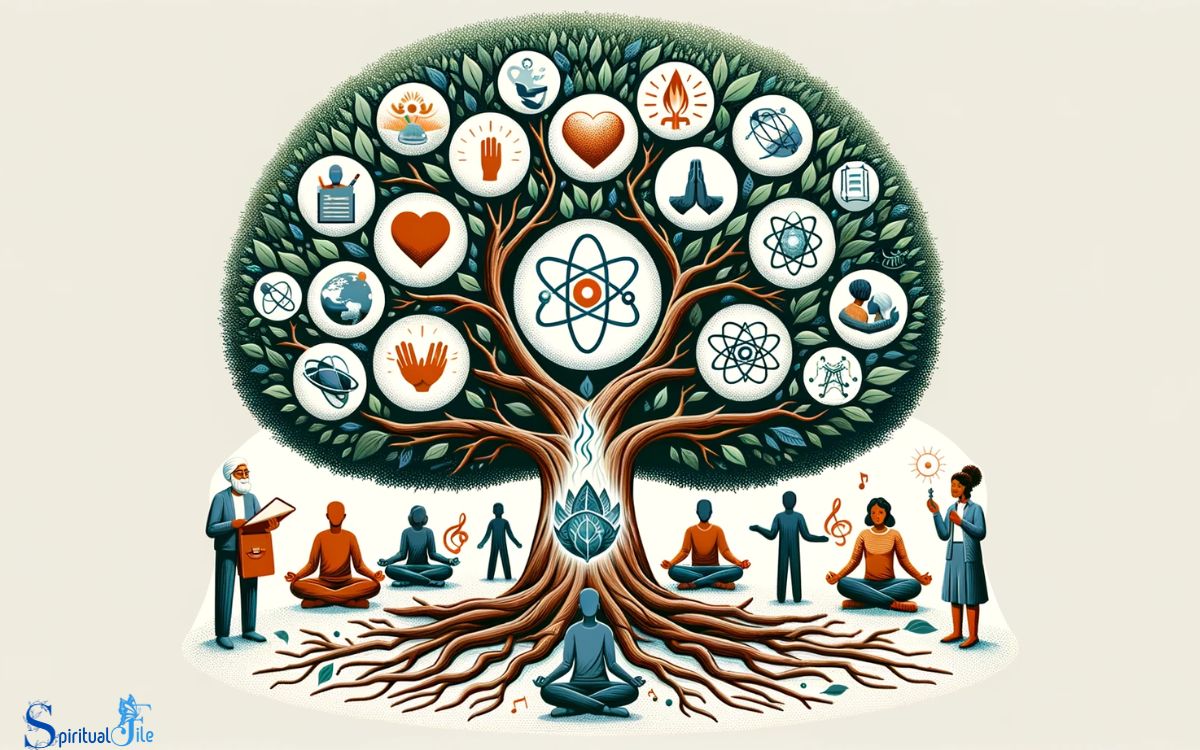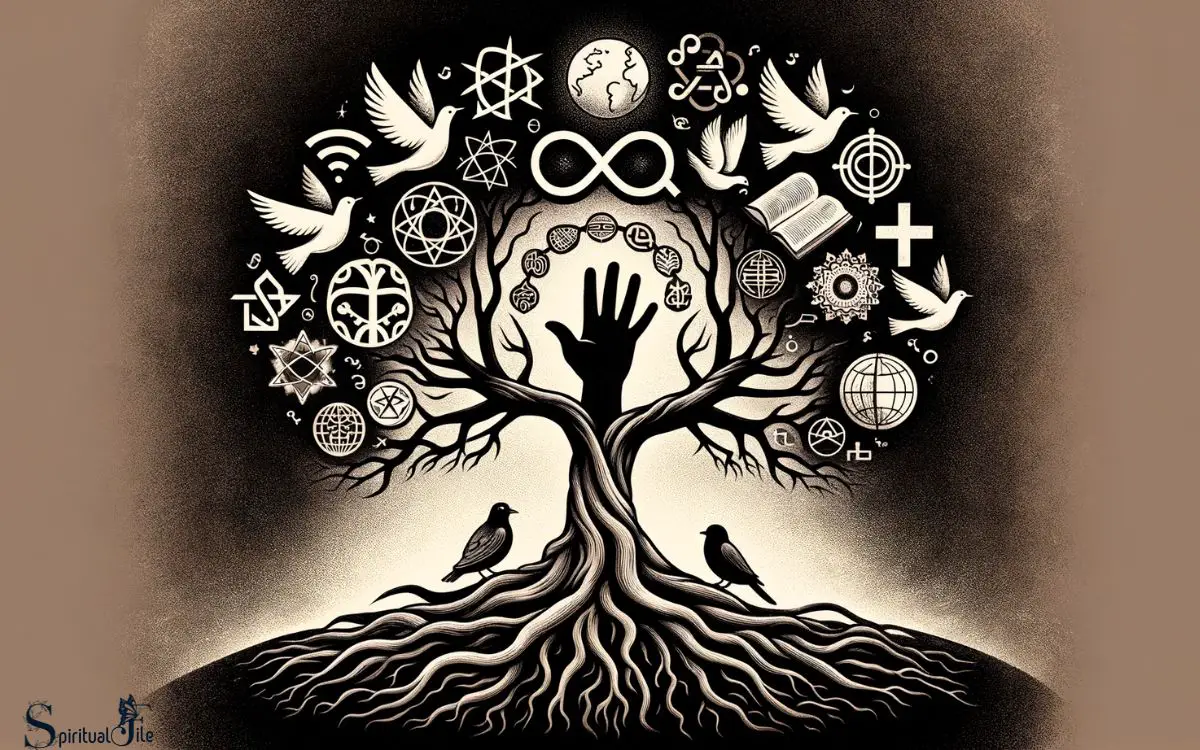Example of Secular Spirituality: Personal Growth!
Secular spirituality refers to the pursuit of personal growth, ethical living, and meaningful experiences that are not centered around a specific religion or deity.
Key Takeaway
5 Interpretations: Example of Secular Spirituality
| Interpretation | Example |
|---|---|
| Inner Fulfillment | Example: Secular spirituality may focus on inner fulfillment, deriving a sense of purpose and well-being from non-religious sources like humanism, nature, or art. |
| Moral and Ethical Values | Example: Secular spirituality can be rooted in moral and ethical values that guide one’s actions and decisions without reliance on religious doctrine. |
| Mindfulness and Meditation | Example: Practices like mindfulness and meditation offer a secular path to spiritual experiences, cultivating self-awareness and inner peace. |
| Connection to Humanity | Example: Secular spirituality may emphasize a deep connection to humanity, promoting compassion, empathy, and a sense of shared purpose among individuals. |
| Existential Exploration | Example: It involves exploring existential questions, such as the meaning of life, death, and the universe, without religious dogma. |
Understanding Secular Spirituality

Understanding secular spirituality involves exploring the concept without relying on religious beliefs.
It encourages self-reflection, mindfulness, and finding meaning in life through humanistic principles. A pertinent example of secular spirituality is the practice of meditation for personal growth and inner peace.
Defining Secular Spirituality:
- Secular spirituality is a framework that enables individuals to explore and cultivate their inner selves, personal growth, and well-being, without relying on religious beliefs or practices.
- It embraces a diverse range of beliefs and practices and provides flexibility to adapt to individual needs and preferences.
- It focuses on connecting with oneself, others, nature, and the universe, while emphasizing mindfulness, self-reflection, and personal agency.
- Secular spirituality recognizes the innate human longing for meaning and purpose and offers individuals a path to a fulfilling and meaningful life.
Holistic Approach To Personal Growth:
- Secular spirituality encourages individuals to take a holistic approach to their personal growth, considering multiple dimensions of their well-being.
- It acknowledges that personal growth extends beyond the physical realm and includes emotional, intellectual, and spiritual aspects of one’s life.
- By embracing practices like meditation, mindfulness, gratitude, and self-reflection, individuals can explore their emotions, thoughts, values, and beliefs, leading to self-discovery and personal transformation.
- Secular spirituality also emphasizes the importance of community and social connections, recognizing that human relationships play a vital role in personal growth and well-being.
Secular spirituality provides individuals with an alternative framework to explore their inner selves, personal growth, and well-being.
The Roots Of Secular Spirituality

“The roots of secular spirituality” offers an example of how secular spirituality can be embraced outside of religious institutions.
Secularism And Spirituality: An Unlikely Pairing
Secular spirituality is an interesting concept that brings together two seemingly contrasting ideas – secularism and spirituality.
It may sound like an oxymoron, but many people today are embracing this unique blend of beliefs and practices. In this section, we will explore the roots of secular spirituality and how it has evolved over time.
Historical Background And Influences
The development of secular spirituality cannot be attributed to one singular event or ideology. Instead, it is influenced by various historical and philosophical movements.
Here are some key historical background and influences:
Enlightenment era: The enlightenment period led to a shift in societal values, emphasizing reason and individual autonomy. This movement provided a foundation for secular thought and the separation of church and state.
Humanist philosophy: Humanism emphasizes the importance of human experience, ethics, and reason.
Humanists seek meaning and purpose in life beyond religious institutions and doctrines, contributing to the development of secular spirituality.
Eastern philosophy and practices: The introduction of eastern philosophies, such as buddhism and mindfulness practices, has played a significant role in shaping secular spirituality.
These traditions offer tools for personal growth, self-reflection, and inner peace, regardless of religious affiliations.
Psychology and self-actualization: Psychological theories and practices, including those of carl jung and abraham maslow, have influenced secular spirituality.
Concepts like self-awareness, personal growth, and self-actualization align with the pursuit of spiritual experiences outside of traditional religious frameworks.
Mystical and transcendental experiences: Throughout history, individuals have reported profound mystical and transcendental experiences that are not necessarily tied to specific religious beliefs.
These experiences of awe, interconnectedness, and transcendence have contributed to the exploration of spiritual practices outside of religious institutions.
The roots of secular spirituality can be traced back to various historical movements, philosophies, and experiences.
By incorporating elements from diverse disciplines, secular spirituality has emerged as a unique and evolving approach to finding meaning, purpose, and connection in an increasingly secular world.
Exploring The Principles Of Secular Spirituality

Examining the principles of secular spirituality offers a refreshing perspective on finding meaning and purpose outside of religious frameworks.
By embracing humanistic values and exploring personal growth, secular spirituality presents an example of a fulfilling and meaningful life journey.
Non-Religious Spirituality: A Balancing Act
Secular spirituality emphasizes the importance of finding a balance between personal exploration and being grounded in one’s immediate world.
Here are some key considerations:
Self-discovery: Taking time for introspection and self-reflection is essential. It involves exploring your values, passions, and beliefs, and aligning them with your actions and choices in life.
Mindfulness: Mindfulness practices, such as meditation and conscious breathing, help to bring awareness to the present moment. By focusing on the here and now, individuals can cultivate a deeper connection with themselves and their surroundings.
Nature connection: Appreciating and experiencing nature can be a source of spirituality for many individuals.
Spending time outdoors, observing the wonders of the natural world, and finding solace in its beauty can help foster a sense of connection and awe.
Community engagement: Engaging with like-minded individuals who share similar values and interests can provide a sense of belonging and support.
Participating in community activities, volunteering, or joining secular groups can facilitate personal growth and connection.
Ethics And Morality In A Secular Context
One of the misconceptions about secular spirituality is that it lacks a moral framework. However, ethics and morality can exist independently of religious beliefs.
Here are some key considerations:
Rational ethics: Secular spirituality often relies on reason, empathy, and compassion to navigate moral dilemmas.
Rational ethics allows individuals to make ethical decisions based on logical and empathetic reasoning, rather than relying solely on religious teachings.
Humanistic values: Human flourishing and well-being are central to secular spirituality. Individuals can cultivate empathy, compassion, and kindness towards all living beings, recognizing the inherent dignity and worth of each individual.
Social responsibility: Secular spirituality encourages individuals to take responsibility for their actions and to contribute positively to society.
It involves promoting fairness, justice, and equality, and advocating for social and environmental issues that align with one’s values.
Secular spirituality offers a unique approach to personal growth, connection, and ethical living outside the realms of organized religion.
By embracing self-discovery, mindfulness, nature connection, community engagement, and rational ethics, individuals can cultivate a fulfilling and meaningful life while staying true to their own values and beliefs.
The Benefits Of Secular Spirituality

Secular spirituality offers numerous benefits, such as providing individuals with a sense of purpose and meaning in their lives, fostering a sense of connection with others, and promoting personal growth and self-awareness.
By embracing secular spirituality, people can cultivate a deeper understanding of themselves and the world around them, without relying on religious beliefs or practices.
Finding Meaning And Purpose In A Secular World
In today’s increasingly secular society, many individuals are seeking ways to find meaning and purpose beyond traditional religious beliefs.
Here are some benefits of secular spirituality:
Embracing personal values: Secular spirituality allows individuals to define and embrace their own set of values and principles that guide their lives.
This empowers individuals to create a sense of meaning that aligns with their unique perspectives and experiences.
Expanding perspective: Engaging in secular practices and exploring different philosophies can broaden one’s perspective on life.
By incorporating diverse perspectives and philosophies, individuals can expand their understanding of the human experience and develop a more inclusive worldview.
Developing inner peace: Secular spirituality emphasizes self-reflection, mindfulness, and self-care practices that can promote inner peace and well-being.
By focusing on the present moment and cultivating a sense of gratitude, individuals can enhance their emotional well-being and find solace in the midst of life’s challenges.
Connecting with others: Secular spiritual communities and practices provide opportunities for individuals to connect with like-minded individuals and engage in meaningful conversations.
This sense of belonging and social connection can foster a deeper sense of purpose and fulfillment.
Empowering personal growth: Secular spirituality encourages individuals to take responsibility for their own personal growth and development.
Through practices such as meditation, journaling, and self-reflection, individuals can nurture their inner growth and unlock their full potential.
Living a values-driven life: Secular spirituality encourages individuals to live in alignment with their values and take actions that promote personal and societal well-being.
This can lead to a greater sense of purpose and fulfillment as individuals strive to make a positive impact in the world.
Practices And Techniques In Secular Spirituality

The practices and techniques in secular spirituality offer an example of how individuals can cultivate a sense of meaning and purpose beyond religious beliefs.
By embracing mindfulness, self-reflection, and ethical living, one can embark on a spiritual journey that is grounded in the present moment and applicable to all.
Mindfulness And Meditation For Secular Individuals
Mindfulness:
- Being fully present in the moment and non-judgmentally observing one’s thoughts, feelings, and sensations.
- Cultivating a sense of inner calm and attentiveness to the present moment.
- Practicing mindfulness can help individuals reduce stress, improve focus, and enhance overall well-being.
Meditation:
- Engaging in focused attention or open awareness practices to quiet the mind and cultivate a sense of inner peace.
- Regular meditation can promote emotional stability, increase self-awareness, and enhance clarity of thought.
- For secular individuals, meditation provides a way to cultivate a deeper connection with their inner selves and explore their spirituality on a personal level.
Secular Approaches To Self-Reflection And Inner Growth
Journaling:
- Writing down thoughts, feelings, and experiences in a journal on a regular basis.
- Reflecting on these entries can provide insights into personal growth, patterns, and areas of improvement.
- Journaling allows secular individuals to explore their inner worlds, gain self-awareness, and foster personal development.
Contemplative practices:
- Engaging in activities such as walking in nature, listening to music, or engaging in creative pursuits.
- These practices encourage individuals to slow down, reflect, and connect with their inner selves.
- Secular individuals can find solace, inspiration, and joy in these contemplative activities, leading to personal growth and a deeper sense of spirituality.
Practices and techniques in secular spirituality provide individuals with the tools to explore their inner worlds, cultivate self-awareness, and foster personal growth and well-being.
Mindfulness, meditation, journaling, and contemplative practices are valuable ways for secular individuals to connect with their spirituality and find a deeper sense of purpose and meaning in life.
Secular Spirituality In Everyday Life
Secular spirituality in everyday life offers countless examples of finding inner meaning and purpose without religious beliefs.
Embracing mindfulness and engaging in ethical actions create a sense of spiritual connection to the world and others.
Nurturing Relationships And Connection
Cultivating empathy: Developing the ability to understand and share the feelings of others can deepen our connections and foster harmonious relationships.
By practicing active listening, engaging in compassionate communication, and showing genuine care, we can build stronger connections and empathy towards others.
Prioritizing presence: In our fast-paced world, it can be easy to get caught up in distractions and lose sight of the present moment.
Secular spirituality encourages individuals to value mindfulness and be fully present in their interactions. This can improve the quality of relationships by allowing us to truly connect and engage with others.
Creating meaningful rituals: While rituals are often associated with religious practices, secular spirituality also recognizes the power of intentional and meaningful rituals.
Whether it’s a daily gratitude practice, a regular family gathering, or a shared meal with friends, establishing rituals can help foster a sense of belonging, connection, and meaning in our lives.
Incorporating practices such as meditation, exercise, and setting boundaries can help us maintain a healthy work-life balance and prevent burnout.
Challenges And Criticisms Of Secular Spirituality

Secular spirituality faces challenges and criticisms regarding its lack of religious framework and potential for an individualistic approach.
However, it provides an example of a spiritual path that focuses on personal well-being and meaning, sans traditional religious beliefs and practices.
Addressing The Skepticism: Can Spirituality Be Secular?
Secular spirituality is a concept that often faces skepticism and criticism from various quarters. However, it is important to delve into these concerns and address them in order to fully understand and appreciate the potential of secular spirituality.
Below are some key points that shed light on the subject:
Defining spirituality: It is crucial to understand that spirituality can be a deeply personal experience, irrespective of one’s religious or non-religious beliefs.
Spirituality is about connecting with one’s inner self, finding meaning and purpose in life, and cultivating a sense of well-being.
Removing religious overtones: Critics argue that spirituality is inherently connected to religion and therefore cannot exist without religious beliefs.
However, secular spirituality aims to separate the concept of spirituality from religious dogma, making it accessible to individuals of all backgrounds and belief systems.
Embracing diverse perspectives: Secular spirituality encourages individuals to explore various philosophical, psychological, and scientific perspectives in their quest for meaning and purpose. It fosters an open-minded approach that blends well with our modern, pluralistic society.
Finding common ground: Another criticism often raised against secular spirituality is its lack of a cohesive framework or set of practices.
However, secular spirituality allows individuals to draw inspiration from a wide range of sources, including mindfulness practices, nature connection, ethical values, and personal growth techniques.
Balancing reason and intuition: Critics might argue that secular spirituality leans too heavily on reason and overlooks the importance of intuition and emotions.
However, secular spirituality embraces a holistic approach, encouraging individuals to explore and integrate both rationality and intuitive wisdom for a deeper understanding of themselves and the world around them.
Conclusion
Secular spirituality offers a unique and refreshing approach to finding meaning and purpose in life.
By embracing practices that are not tied to any particular religious tradition, individuals are able to tap into their own inner wisdom and connect with something greater than themselves.
Whether it’s through mindfulness, meditation, nature exploration, or self-reflection, secular spirituality provides a pathway for personal growth and development that is accessible to people of all backgrounds and beliefs.
This inclusive and adaptable approach allows individuals to create their own spiritual journey, free from dogma or rigid doctrines.






